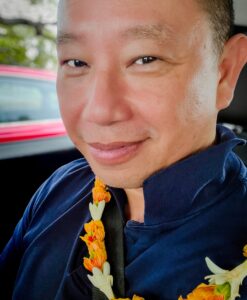This post was written by NCTE member Tien Pham.
As I rode up those escalators, my stomach was all fluttered with anxiety, and as the large NCTE sign greeted me at the top, every stitch of my clothing felt tight, sweat poured, and not a single item I had on felt comfortable. I sat at my first session and reminded myself that I was here to learn; my finger traced over the sticker I had on the front of my notebook that served as my mantra for the rest of that weekend: “Be. Be present. Be you. Be strong. Be enough. Be devoted. Be content.” You have no idea how many times I repeated “Be enough” to myself that morning and the day before.
My first session was “Asian American: Personal Inquiries into Diverse Identities and Narratives.” I exhaled. Just be, I told myself. I listened, and I took notes, and my mind eased for the first time, while my heart just started filling up with joy. I have never been at an in-service, or a class, or a lecture where Asian Americans were centered. Never. Yet, here at NCTE, there it was. It was a mental hug. The authors and facilitators reminded us of the importance of representation and how representation matters as it “is about identity and self love. It is about seeing and being seen. It is about knowing that you exist and are loved.” It was something my heart needed to hear, as it had been operating on stress and sometimes sorrow. At the bottom of my notes, I wrote “writing as a way back in [literature]” and “lack of representation leads to feelings of erasure.” Perhaps the imposter syndrome wasn’t a result of not being good enough, but rather being good enough but not having a community or not seeing yourself in the literature that you work with. Lack of representation and lack of identification in literature leads to a sense of false and hollow foundation of oneself. When your foundation is false and you operate on that foundation, just how long can you sustain before you run out of steam or out of joy? While that first session fed my soul, the rest of the sessions that day provided me with so many ideas that I brought back to my classroom, from ways to do a writing workshop with my students, to how to elevate marginalized voices in your classrooms through writing, to teaching my students to be better writers and how to revise their writing. I ended the day with one final session, and that was the meet and greet with the Asian American Caucus.
A few months prior to Baltimore, I saw a picture on Twitter of a group of Asian English teachers that stopped my finger from flicking onward on the screen. There on my phone was a small group of people who were similar to me in profession and in race. I wasn’t the lone unicorn. So, that afternoon in Baltimore when I stepped foot into the room and saw all Asian faces smiling back at me, it was as if I’d known these people in some capacity for most of my life; they were the faces of my aunts, my sister, my cousins, my relatives all staring back at me. There was no judgment and no expectation in the eyes, there was just acceptance in the smile and that sense of home in the way we introduced our names to each other. The way our tongues moved and created our names, the very un-American but very American sounds, without feeling the need to apologize or the need to make exceptions, no dramatic pauses or hyphens needed. There we all were, some of us, like myself, being seen and acknowledged for the first time. That afternoon, we circled up and shared our experiences being English teachers in America, each one adding his or her story to the collective, creating a metaphorical library of stories and experiences. Prior to the Convention, I often heard that representation matters, but I don’t think I actually knew what it felt like or how much it mattered until I saw all the faces, versions of my face, staring back at me with nothing but acceptance and understanding. We all shed so many tears that afternoon, and in that small room our little community of Asian American English teachers grew. We were the people we had been waiting for.
When people ask me why I go to NCTE every year, I tell them because I found my community and my support there. NCTE is the largest and smallest conference you will go to. You go to NCTE to improve your teaching, but while you are there, your spirit will also be filled with love and joy.


